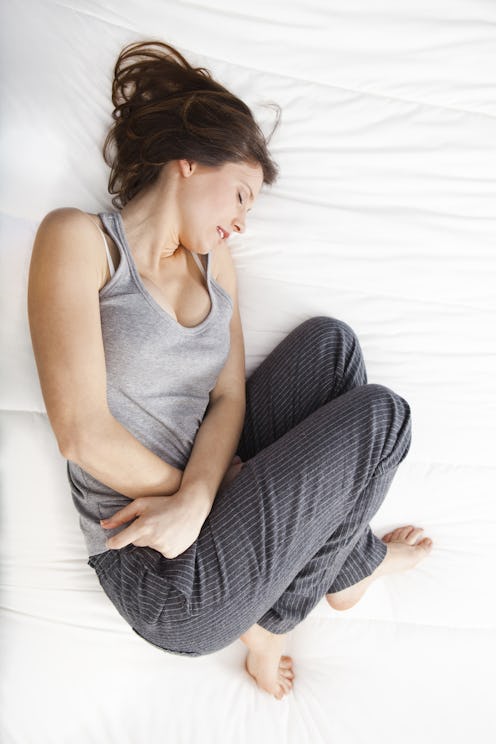Life
Can Antidepressants "Cure" PMS?

As 51 percent of the population is well aware, premenstrual syndrome (or PMS, as you probably know it) is pretty much the worst, but until recent decades, we've had to rely on strange home remedies from sleep deprivation to primrose oil if the traditional stuff didn't work. However, scientists finally have good news for those of us who don't feel like following our great-aunt's old-timey suggestions, because recent research shows that antidepressants can prevent PMS. Feel free to do a little dance for joy in your chair. Heaven knows I couldn't restrain myself. For most people, PMS just means irritating mood swings right before your period, but for others it can be much worse, with symptoms like insomnia, joint pain, weight gain, acne, and fatigue. Considering how common depression (and its awkward, unwanted cousin anxiety) is with PMS, it makes sense that there's a growing body of research indicating that antidepressants can help with the symptoms, but it's not for the reason you'd think. A recent study published in the British Journal of Pharmacology last week showed that when rats were injected with fluoxetine (more commonly known as Prozac), they showed increased levels of the sedative allopregnanolone. A previous study with similar findings, published in European Neuropsychopharmacology, hypothesized that lower levels of allopregnanolone are related to the increased sensitivity to stress that results in PMS symptoms.I bet you weren't expecting to have all these chemical names tossed around during your afternoon energy slump, were you?
But that's what I'm here for! Basically, researchers have found lower levels of allopregnanolone in women during the luteal phase, which is the latter half of your menstrual cycle. The lower levels of the sedative could make women more sensitive to stress, which could in turn be the cause of PMS. The scientists behind the British Journal of Pharmacology study heard about the increasingly common prescription of antidepressants for PMS, hypothesized that this was related to the allopregnanolone levels, and tested it with rats, who have a similar menstrual cycle to humans. They found that fluoxetine does, in fact, increase allopregnanolone levels, which is probably why it works for PMS rather than its effect on serotonin. The European Neuropsychopharmacology study supported their results, and found that antidepressants could prevent PMS symptoms as well as just managing them. It's a Christmas miracle!
Some people will probably be a little leery of taking antidepressants if they don't actually have depression, and they would be totally justified. It's understandable not to want to mess around with psychoactive drugs when you're mentally healthy, especially in light of the staggering increase of antidepressant use in the past 10 years. However, the amount of antidepressant prescribed for PMS symptoms is significantly smaller than what's prescribed for actual depression. So it's up to you guys, but next time you find yourself chewing out your roommate for leaving a single dirty dish in the sink, aware you're overreacting even as you're writing the passive-aggressive note but unable to stop, maybe keep these studies in mind. And hey, there's always chocolate!...Except there's no actual correlation between chocolate cravings and PMS, and our lives have all been a lie.
Images: Fotolia; Giphy (2)